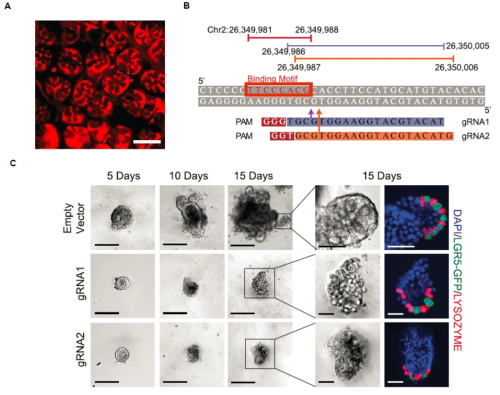Chinese Academy of
Sciences Protein
Science core facility
Center |
|
|
Notch Positive Feedback Loop Regulates Intestine Stem Cell Self-renewal |
| Author: |
|
Update time: |
2017-05-18 |
|
The small intestine and colon are lined with a single layer of epithelium cells. The intestinal epithelium is indispensable to human health due to its multiple tasks including food digestion, nutrients absorption and lethal pathogen defense. Simultaneously, persistent exposure to luminal contents results in epithelial cell largely dead every day. Therefore, the intestinal epithelium is replaced every 3-5 days, making it one of the fastest regenerative tissues in the body.
Epithelium regeneration requires fast-cycling adult intestine stem cells (ISCs) which reside at the base of crypts and form a mosaic stem pattern adjacent lysozyme-secreting Paneth cells. Given their proliferative potential, the number of ISCs has to be carefully managed. The mosaic stem pattern enforces a relatively fixed number of niche slots for ISCs – when an ISC is lost, the adjacent ISC divides to fill in the slot while extra ISCs without an available slot are forced to differentiate. Once ISCs acquire mutations to undermine this spatial control, they proliferate alongside Paneth cells to form adenomas outside the niche. However, the regulatory mechanism of this dynamic stem cell niche pattern is largely unclear.
On April 28 2017, Molecular Systems Biology reported research progression from Prof. BU Pengcheng laboratory in Institute of Biophysics of the Chinese Academy of Sciences Chinese and Prof. SHEN Xiling laboratory in Duke University. In their study, they found Notch forms a positive feedback loop in ISCs to regulate ISCs self-renewal and maintain the mosaic stem cell/niche pattern.
In the research article entitled “A Notch positive feedback in the intestinal stem cell niche is essential for stem cell self-renewal”, they found ISCs express high levels of Notch1 and Notch2 receptors, whereas Paneth cells express the Notch ligand DLL1 and DLL4. The interaction of Paneth cells and ISCs activates Notch signaling in ISCs. The active Notch format complex, NICD/RBPJk directly binds to Notch gene to further upregulate Notch receptor expression and amply Notch signaling in ISCs. Notch-mediated positive feedback signaling is active in both mouse and human ISCs.
Perturbation of the positive feedback by CRISPR/Cas9 mutation of the binding sequence markedly reduced colony forming efficiency and growth rate of intestinal organoids, number of ISCs and the ratio of ISC to Paneth cell in the niche, indicating Notch positive feedback is critical for organoids regeneration and the mosaic stem cell niche pattern maintenance. Dynamical system analysis and agent-based multiscale stochastic modeling suggests that Notch positive feedback increases robustness, stability and speed of Notch-mediated patterning, which significantly benefits intestine epithelium regeneration.
The study provided a comprehensive picture of the crypt system, which may lead to future therapeutic strategies to correct impaired decision-making in intestinal diseases such as colorectal cancer, provide insights for other fast-cycling stem cell niche systems such as the hair follicle stem cell niche, and help discover general design principles for developmental pattern formation.
Prof. BU Pengcheng and Prof. SHEN Xiling are the co-corresponding authors. 
Figure 1. Notch positive feedback loop regulates ISC self-renewal (Image by IBP). (A) Notch1 expression in ISCs.
(B) Mutagenesis of NICD/RPBJk binding site in Notch1 .
(C) ISC self-renewal inhibited by perturbation of Notch positive feedback loop.
Contact:
Pengcheng Bu
Principal Investigator
Institute of Biophysic, Chinese Academy of Sciences
Email: bupc@ibp.ac.cn
|
|
|
|